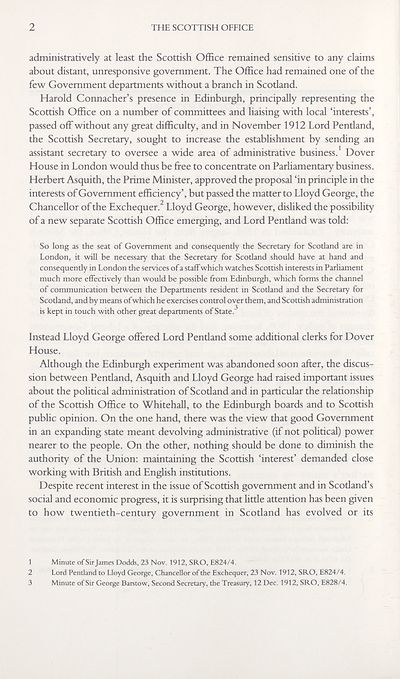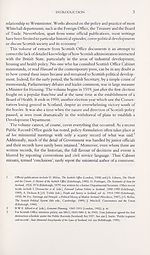Series 5 > Scottish Office
(17) Page 2
Download files
Complete book:
Individual page:
Thumbnail gallery: Grid view | List view

2
THE SCOTTISH OFFICE
administratively at least the Scottish Office remained sensitive to any claims
about distant, unresponsive government. The Office had remained one of the
few Government departments without a branch in Scotland.
Harold Connacher’s presence in Edinburgh, principally representing the
Scottish Office on a number of committees and liaising with local ‘interests’,
passed off without any great difficulty, and in November 1912 Lord Pendand,
the Scottish Secretary, sought to increase the establishment by sending an
assistant secretary to oversee a wide area of administrative business.1 Dover
House in London would thus be free to concentrate on Parliamentary business.
Herbert Asquith, the Prime Minister, approved the proposal ‘in principle in the
interests of Government efficiency’, but passed the matter to Lloyd George, the
Chancellor of the Exchequer.2 Lloyd George, however, disliked the possibility
of a new separate Scottish Office emerging, and Lord Pentland was told:
So long as the seat of Government and consequently the Secretary for Scotland are in
London, it will be necessary that the Secretary for Scodand should have at hand and
consequently in London the services of a staff which watches Scottish interests in Parliament
much more effectively than would be possible from Edinburgh, which forms the channel
of communication between the Departments resident in Scotland and the Secretary for
Scotland, and by means of which he exercises control over them, and Scottish administration
is kept in touch with other great departments of State.
Instead Lloyd George offered Lord Pendand some additional clerks for Dover
House.
Although the Edinburgh experiment was abandoned soon after, the discus¬
sion between Pentland, Asquith and Lloyd George had raised important issues
about the political administration of Scodand and in particular the relationship
of the Scottish Office to Whitehall, to the Edinburgh boards and to Scottish
public opinion. On the one hand, there was the view that good Government
in an expanding state meant devolving administrative (if not political) power
nearer to the people. On the other, nothing should be done to diminish the
authority of the Union: maintaining the Scottish ‘interest’ demanded close
working with British and English institutions.
Despite recent interest in the issue of Scottish government and in Scodand’s
social and economic progress, it is surprising that litde attention has been given
to how twentieth-century government in Scotland has evolved or its
1 Minute of Sir James Dodds, 23 Nov. 1912, SRO, E824/4.
2 Lord Pendand to Lloyd George, Chancellor of the Exchequer, 23 Nov. 1912, SRO, E824/4.
3 Minute of Sir George Barstow, Second Secretary, the Treasury, 12 Dec. 1912, SRO, E828/4.
THE SCOTTISH OFFICE
administratively at least the Scottish Office remained sensitive to any claims
about distant, unresponsive government. The Office had remained one of the
few Government departments without a branch in Scotland.
Harold Connacher’s presence in Edinburgh, principally representing the
Scottish Office on a number of committees and liaising with local ‘interests’,
passed off without any great difficulty, and in November 1912 Lord Pendand,
the Scottish Secretary, sought to increase the establishment by sending an
assistant secretary to oversee a wide area of administrative business.1 Dover
House in London would thus be free to concentrate on Parliamentary business.
Herbert Asquith, the Prime Minister, approved the proposal ‘in principle in the
interests of Government efficiency’, but passed the matter to Lloyd George, the
Chancellor of the Exchequer.2 Lloyd George, however, disliked the possibility
of a new separate Scottish Office emerging, and Lord Pentland was told:
So long as the seat of Government and consequently the Secretary for Scotland are in
London, it will be necessary that the Secretary for Scodand should have at hand and
consequently in London the services of a staff which watches Scottish interests in Parliament
much more effectively than would be possible from Edinburgh, which forms the channel
of communication between the Departments resident in Scotland and the Secretary for
Scotland, and by means of which he exercises control over them, and Scottish administration
is kept in touch with other great departments of State.
Instead Lloyd George offered Lord Pendand some additional clerks for Dover
House.
Although the Edinburgh experiment was abandoned soon after, the discus¬
sion between Pentland, Asquith and Lloyd George had raised important issues
about the political administration of Scodand and in particular the relationship
of the Scottish Office to Whitehall, to the Edinburgh boards and to Scottish
public opinion. On the one hand, there was the view that good Government
in an expanding state meant devolving administrative (if not political) power
nearer to the people. On the other, nothing should be done to diminish the
authority of the Union: maintaining the Scottish ‘interest’ demanded close
working with British and English institutions.
Despite recent interest in the issue of Scottish government and in Scodand’s
social and economic progress, it is surprising that litde attention has been given
to how twentieth-century government in Scotland has evolved or its
1 Minute of Sir James Dodds, 23 Nov. 1912, SRO, E824/4.
2 Lord Pendand to Lloyd George, Chancellor of the Exchequer, 23 Nov. 1912, SRO, E824/4.
3 Minute of Sir George Barstow, Second Secretary, the Treasury, 12 Dec. 1912, SRO, E828/4.
Set display mode to:
![]() Universal Viewer |
Universal Viewer | ![]() Mirador |
Large image | Transcription
Mirador |
Large image | Transcription
Images and transcriptions on this page, including medium image downloads, may be used under the Creative Commons Attribution 4.0 International Licence unless otherwise stated. ![]()
| Scottish History Society volumes > Series 5 > Scottish Office > (17) Page 2 |
|---|
| Permanent URL | https://digital.nls.uk/127346205 |
|---|
| Description | Over 180 volumes, published by the Scottish History Society, containing original sources on Scotland's history and people. With a wide range of subjects, the books collectively cover all periods from the 12th to 20th centuries, and reflect changing trends in Scottish history. Sources are accompanied by scholarly interpretation, references and bibliographies. Volumes are usually published annually, and more digitised volumes will be added as they become available. |
|---|

![[Page 1]Introduction](https://deriv.nls.uk/dcn4/1273/4619/127346195.4.jpg)
